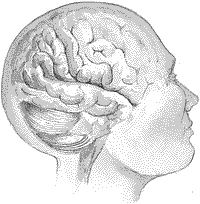Electrodes in brain to 'switch off' pain
Breakthrough implant surgery may help patients
to control agony caused by major injury.
Jo Revill reports
Hundreds of patients who are in agonising long-term pain following serious injury or a stroke could have their lives transformed by surgery that involves implanting electrodes in the brain.The device, which was developed to help patients with Parkinson's Disease, has been found to reduce pain significantly for a group of other patients who, until now, had little hope of relief.
Oxford neurosurgeon Professor Tipu Aziz is carrying out a trial involving 40 patients, all of whom have experienced long-term serious pain that cannot be alleviated by other therapies or medication.
In some cases the patients had contemplated committing suicide because they found their daily life unbearable.
His study so far shows that in around 80 per cent of cases levels of pain were reduced. In some the reduction was dramatic, in others it was enough to enable them to lead better lives.
The operation - similar to a fictional one shown in last week's episode of the BBC TV soap Holby City - is known as deep brain stimulation. It involves drilling two tiny holes in the skull so that two electrodes can be implanted deep in the brain. The electrodes are wired to a brain 'pacemaker', a device that sends out low voltage electrical signals to the brain.
The patient is awake during the two-hour operation - receiving only a local anaesthetic to the skull - enabling Aziz to position the electrodes by asking the patient to tell him when they feel their pain subsiding.
A week after the initial surgery, doctors implant the pacemaker device either next to the collarbone or in the abdominal area, and the strength of the voltage can be altered by the patient using a switch.
The surgery is expensive, at around £30,000 per patient, and some NHS primary care trusts are refusing to fund it, arguing that its effects are so far unproven. Aziz, professor of neurosurgery at Imperial College London, who works at the Radcliffe Infirmary in Oxford, is convinced that the treatment is effective and worth the money, and he is working hard to persuade health officials of its value.
'It is expensive but in the long term it's worth it because you can get people back into work and off other medications,' he told The Observer .
'It is humane to offer this surgery. I deal with patients who are crippled by really horrendous pain, and it can make a very dramatic difference to their lives.'
The pioneers of the technique do not know exactly how it works but the implants are thought to affect the functioning of the sensory pathways in the brain. Following an injury to the nerves, the brain may no longer get signals from a particular part of the body, creating an area of 'silence'.
Aziz said: 'We believe that once the sensory nuclei [cells] of the brain lose their normal input, they start to oscillate because they are not getting the information they need.' By implanting the electrodes the stimulation provides the cells with a regular signal, so the area of 'silence' is filled in.
Two-thirds of the 40 patients taking part in the trial were suffering severe pain after a stroke.
One of them, Martin Priddle, a former sales manager, had the treatment to relieve the agony he experienced after having his stroke four years ago when he was 34.
The pain before his operation was appalling. 'My right leg felt as if it were a block of cement swinging on hinges. It was a combination of a feeling of cramp and a stinging sensation, and the pain ran from the back to the front of my leg,' said Priddle.
'For a long time I couldn't sleep at all at night, and the touch of clothes against my body was unbearable. Gradually the pain got worse, and I took more and more morphine. I thought I would not make it through another year, that I would have to take my life because each day was becoming unbearable.'
The operation greatly relieved his suffering but a year later he fell over and the wires were jolted, so he needed more surgery to reconnect the electrodes.
He now feels very lucky. 'When I occasionally turn the stimulator off, the pain comes back after about 10 minutes. Then I'm reminded of what I'm missing,' said Priddle, from Belvedere, south London.
'Unless you've been in this kind of pain you can't imagine what it's like to have it lifted from you.'
HOME
SEARCH
Opioids.wiki
Utopian Surgery
Hypermotivation
Riley-Day syndrome
Utopian Brain Stimulation?
The Orgasm Command-Center
The Transcranial Magnetic Stimulator
Can Electric Implants Banish Headaches?
Wireheads and Wireheading in Science Fiction
Pleasure Evoked by Electrical Stimulation of the Brain
Wireheads and Wireheading: Definitions from Science Fiction
dave@bltc.com

